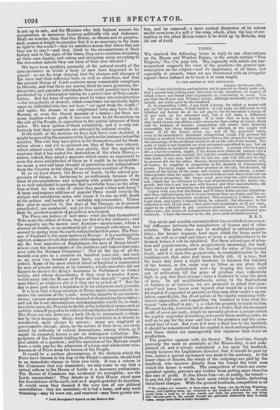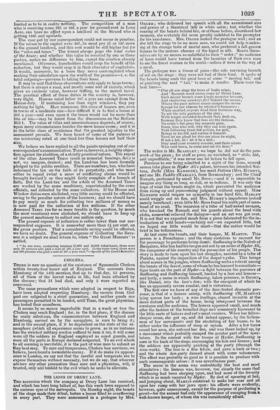TAXES.
WE received the following letter in reply to our observations on the House and Window Duties, in the article entitled " Two Projects," No. 170, page 953. The ingenuity with which our cor- respondent supports his view of the question—the general mis- conception on the subject—and its importance at all times, but especially at present, when we are threatened with an irregular repeal—have induced us to treat it at some length.
TO THE EDITOR OF THE SPECTATOR.
London, Srd October 1831.
Sia—Your calculations and opinions are in general so clearly made out, that I cannot help calling your attention to one exception, in respect of which I have not found your arguments so convincing as usual. You say that the House and Window duties, although nominally paid by the tenant, are really paid by the landlord. If, by expending 1,000/., I can build a house, for which a tenant will pay me 70/. per annum, I shall build it : it will make no difference to me whether my tenant do or do not pay to the Government a charge of 25 per cent. on the aforesaid rent, but it will make a difference of 25 per cent. to my tenant. It is clear that so long as those who build houses can obtain a fair return for their outlay of money, there will be builders of houses : competition will render their demands reasonable, but those demands must be satisfied, or the supply will cease. If all the King's taxes, ay, and all the parochial rates, were to be immediately abolished, competition would Will prevent the builder or landlord from obtaining more than a fair return for his capital: the advantage of the abolition would be all on the side of the tenant. The scale of rents is not founded on what occupants can afford to pay, but on what builders or landlords can afford to receive. A person who now pays
40/. a year for a house, might, if the duties were taken off, remove into a more commodious one and pay 50/.; but this would not benefit the builder, who must, in any case, have 50/. for the one, and will still only be able to procure 40/. for the other. Houses, being articles of manufacture, will, of course, be supplied in proportion to the demand at remunerating prices. For corn, sugar, and other produce of the soil, the demand, by- reason of the failure of the crops and various uncertain causes, is some- times greater than the supply : on such articles at such times taxes fall on the grower altogether ; the buyer must give what the seller chooses to ask, which has no reference to the cost of production or the duties im- posed; but this is not the case with houses and other manufactures, all taxes whereon fall invariably on the occupants and consumers.
I agree with you that the House and Window duties are less objection- able than indirect taxes, but it is only because they are direct, and the ex- pense of collection therefore moderate. This expense is, I believe, about 6 per cent., and might, I should think, be reduced ; the allowance to the collector is only 1+ per cent.; to inore such poundages, or 21- per cent., ought to be sufficient to pay receivers-general, surveyors, clerks, and office-rent ; the duties of commissioner and assessor are performed gra- tuitously. I have the honour to be, Sir, your most obedient servant,
B. S. S.
Our acute and sensible correspondent has overlooked one essen- tial difference between the manufacture of houses and of other articles. The latter class can be multiplied in unlimited quan- tities; the former requires land upon which the house must be built, as well as a road and (more or less) a neighbourhood to be formed, before it will be inhabited. For these advantages of situa- tion and populousness, often progressively increasing, the land- lord is paid a ground-rent far beyond the value of the ground itself; and it is upon this ground-rent, in contradistinction to the building-rent, that rates and taxes finally fall. It is true, that the taxes may have a slight tendency to increase the burdens of the tenant, in the same way as tithes or any other fixed charges upon agricultural rent—by keeping the lower soils out of cultivation till the price of produce rises sufficiently high to pay this fixed charge—have a tendency to raise the price of corn. In old neighbourhoods, owing to the fluctuations of fashion or of business, we are prepared to admit that poor- rates * and taxes lower rent beyond what would be a fair return for capital if expended at present, as they may often render a specu- lation unprofitable, the fixed nature of the capital rendering with- drawal impossible, and compelling the landlord to take what the tenant "can afford to pay," i. e. what the property is worth to him. We need hardly, however, tell so shrewd a writer, that the (average) profit of seven per cent., which he correctly gives as a proper return for capital expended in building, is to cover these contingencies, as well as to pay for the wear and tear of the premises and the occa- sional loss of rent. But even if it were a dead loss to the landlord, it should be remembered that his capital is inert and unproductive, and these duties are consequently less injurious than taxes on production. The practice squares with the theory. The Land-tax, though precisely the same in principle as the House-duty, is not com- plained of, and is always considered a tax upon the landlord, simply because the Legislature directed that it should be paid by him, unless a special agreement was made to the contrary. In the lower class of houses, the whole of the outgoings are paid by the landlord, who receives directly from the tenant the total sun' which the house is worth. The competition of which our corre- spondent speaks, prevents any builder from getting more than the fair rate of profit. It also forces him—or, in reality, his tenant— to pay the full value of the land upon which he builds, deducting these fixed charges. • With the ground landlords, competition is so
• We confine our remarks to Poor-rates and Taxes ; for the Paving, Watching. Sewer, and Lighting rates, are returned to the landlord with interest. No man could form a road to, or drain, watch, and light his premises, for any thing like the sum paid to the parish, though the parochial authorities may, in many cases, charge more than is really necessary.
limited as to be in reality nothing. The competition of a man who is receiving some 301. or 40/. a year for ground-rent in Long Acre, can have no erect upon a landlord in the Strand who is getting 100/. and upwards. The case put by our correspondent could not occur in practice. If the return to the capital were 401., he must pay 5/. or 101. more to the ground landlord, and this rent would be still higher but for the "rates and taxes." The tenant always pays the total value of the house; and whether this value be received by one or three parties, makes no difference to him, except the reaction already mentioned. Of course, leaseholders would reap the benefit of the reduction, but they would reap it in their character of capitalists. It would, moreover, be a boon they never contemplated when making their calculation upon the worth of the premises—i. e. the total outgoings—previous to taking their lease. It may be said that these observations only apply to large towns ; but there is always a road, and mostly some sort of vicinity, which gives an extrinsic value, however trifling, to the merest hovel. The practical effect of these duties in- the country is, however, very slight. Houses rated below 101. a year are exempt from the House-duty. If containing less than eight windows, they pay nothing for light. How numerous this class of houses are, even in towns of a moderate size—how difficult it is to find a house at 20/. a year—and even upon it the taxes would not be more than 50s. or 605.—may be learnt from the discussions on the Reform Bilit. The value of villas and mansionhouses depends, of course, tipon many circumstances besides the mere house-room ; and it is in the latter class of residences that the greatest injustice in the assessment prevails. We have heard of some of the palaces of our aristocracy rated at one third less than houses not half their size.
We believe we have replied to all the points springing out of our correspondent's communication. There is,however, a weighty objec- tion against the abolition, of a strictlypractica/ nature. The repeal of the other Assessed Taxes (such as armorial bearings, &c.) is not, we imagine, desired ; and the Land-tax has been formally pledged to the public creditor. There are numbers, too, who have redeemed the tax on the faith of its perpetuity, and who must either be repaid (what a mass of conflicting claims would be brought forward!) or they might fairly complain of a breach of faith. But the Land-tax and the whole of the Assessed Taxes are worked by the same machinery, superintended by the same officials, and collected by the same collectors. If the House and Window duties were abolished, very little saving could be effected, owing to the peculiar nature of the business; and we should have to pay nearly as much for collecting two millions of money as is now paid for the collection of five millions. If the other Assessed Taxes (as far as mere trouble is the question, by much the most vexatious) were abolished, we should have to keep up the present machinery to collect one million only. The present expense of collection is rather lower than our corl respondent supposes. It is somewhat more than 51 per cent, on the gross produce. That a considerable saving could be effected, we have no doubt. The general expense of Collecting the Reve- nue is a subject we shall return to, when "the Great Measure" is settled.
t "In one town, containing between 17,000 and 18,000 Inhabitants, there were only 20 persons who paid a rent of 201. a year each. In the same town, there were Dot 300 persons who paid a rent of 10/. a year each."—Speech of the Lord Chancellor.



























 Previous page
Previous page